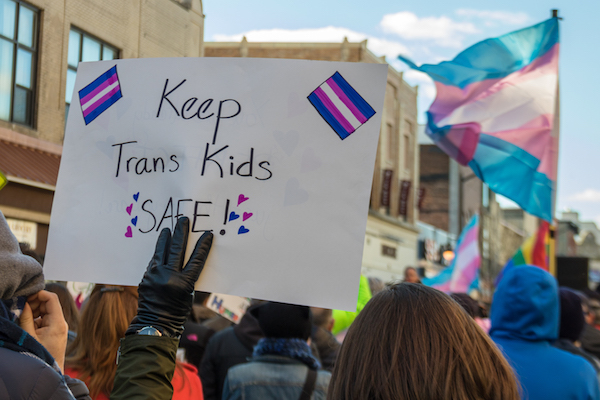Last Wednesday, the South Dakota House of Representatives passed HB 1057, a bill that would make it a misdemeanor for doctors to provide gender-affirming care to transgender patients under the age of 16. If the bill passes, it would be the first state in the nation to codify this kind of restriction into law, though at least five other states are currently considering similar legislation, including Florida, Oklahoma, South Carolina, Missouri, and Colorado.
South Dakota’s bill, which is also called the Vulnerable Child Protection Act, prevents doctors from providing treatment to transgender youth “when such procedures are done to cause the minor to feel or appear as the opposite sex.” This precludes doctors from performing or prescribing a range of medical options, including hormone replacement therapy, puberty-blockers, and gender confirmation surgery.
Doctors or other medical professionals who provide such care could be punished with up to one year in jail or a fine as high as $2,000. When the bill was first introduced, these acts were considered a felony and punishable by ten years imprisonment and an optional fine of $30,000. Unfortunately, the bill also contains an exception that allows doctors to perform surgery on intersex people without consequence.
The bill was first introduced in the House on January 14 by Rep. Fred Deutsch, and sponsored by 46 other Republican lawmakers, which is close to half of the state legislature. Rep. Deutsch has been outspoken in his bigotry against transgender people; just recently, he compared doctors who assist with gender-affirming medical procedures to Nazis who performed “bizarre medical experiments” during the Holocaust. He has also characterized these gender-affirming treatments as the “mutilation of our children.”
Numerous LGBTQ advocacy groups and medical organizations have rightly spoken out about the danger of this bill. For example, National Center for Transgender Equality executive director Mara Keisling has characterized the bill as “one of the most extreme and dangerous pieces of legislation in the country.” Likewise, American Medical Association CEO James Madura wrote that HB 1057 keeps transgender youth from gaining the “opportunity to explore their gender identity under the safe and supportive care of a physician.”
Many others transgender advocates and medical professionals who oppose the bill have also noted the complete disregard for science and research that characterizes this bill. For example, Dr. Alexis Chávez, who works as a psychiatrist and medical director for the Trevor Project, recently told the New York Times: “They’re not using actual evidence. They’re not using the research. They’re not listening to any health care providers.” And she is absolutely right, as studies have shown that gender-affirming treatments can decrease the suicide risk for transgender people and is “associated with superior mental health outcomes in adulthood.”
HB 1057 is now on its way to South Dakota’s Republican-controlled Senate, where there will be a hearing in the Senate Health and Human Services Committee on February 10. If the bill moves out of committee and is passed by the Senate, it will then move to the desk of Republican Governor Kristi Noem. As of February 1, Noem has not indicated whether she would sign the bill into law, though she has expressed some concerns over the bill since it “take[s] public policy and tr[ies] to fill parenting gaps with more government.” She has also said she would have signed the state’s 2016 anti-trans bathroom bill if she were governor at the time.


